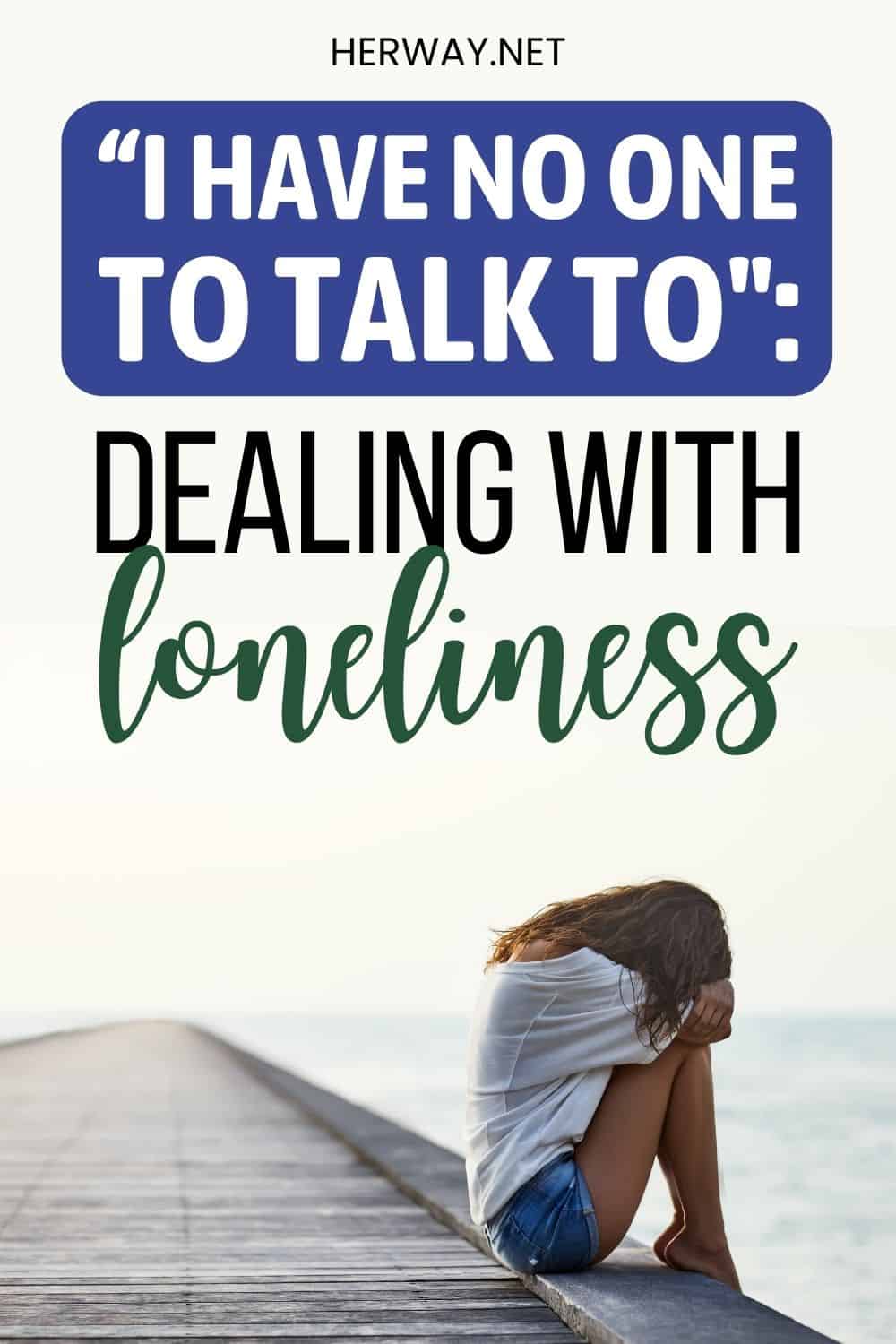Feeling lonely once in a while is normal. Loneliness is a state of mind that happens when you don’t feel connected to anyone regardless of how many people you are surrounded by. Everyone has moments when they think, “I have no one to talk to,” but it’s important that these feelings are resolved.
Persistent loneliness and feelings of social isolation can be harmful to your mental health and well-being. When these feelings last for a long time, they can be damaging and lead to various mental health conditions. People need other people and meaningful social interaction is key to having social needs met.
Here’s how to deal with loneliness when you feel like you have no one to talk to.
When I Have No One To Talk To, What Can I Do?
Have you ever thought, “I have no one to talk to?” Feelings of loneliness make you yearn to connect to other people, but at times it can seem impossible. Factors such as being in a new place, social anxiety or having a low self-esteem can make you feel isolated without a solution in sight.
There are things you can do to help you deal with those feelings and things you can do to change your circumstances and bond with people.
What to do when you have no one to talk to?
The first step to dealing with feelings of loneliness is to learn how to express them and accept that sometimes you’re going to feel that way. It can seem like a vicious circle: if you have no one to talk to about your feelings, how can you express them at all? These are the solutions.
1. Visit a mental health professional
If you need to talk to someone to help you deal with your problems or manage stress, your health care provider can refer you to a therapist you can talk to.
Therapy isn’t only for people dealing with big life changes, such as a break up or struggling with a mental illness, but for everyone.
Having the opportunity to have someone listen to you with understanding when you need to talk can sometimes be all you need. Whether you’re dealing with a mental health issue or simply need to talk, a therapist can teach you coping skills and help you see things from a different perspective if necessary.
2. Contact a crisis hotline
Don’t hesitate to contact a helpline to talk to a trained counselor if you feel that you need to talk to someone.
Some useful resources are the Substance Abuse and Mental Health Services Administration National Helpline you can call at 1-800-662-HELP (4357) or you can text the Crisis Text Line at 741741 if you need support.
If you’re feeling suicidal, please call 988 or contact the National Suicide Prevention Lifeline website.
3. Find a support group
Sometimes simply talking to someone who’s going through the same thing as you can be helpful. A support group can provide perspective and understanding from people who can relate to you because they’re experiencing a similar problem.
Peer support makes you feel accepted and can bring you closer to the others involved in the group. As you share and listen to each other’s experiences, you give each other reassurance and comfort.
4. Explore spirituality
Spirituality means different things to different people, but it’s undeniably helpful when it comes to mental health. Whether or not you’re religious, finding spiritual balance in your life can be helpful when you’re feeling like you have no one to relate to.
If you are a part of a faith community, visiting a local service can be helpful to feel connected to your spirituality, as well as help you meet people. It will give you a sense of belonging to a community and give you an opportunity to bond with people who share your beliefs.
5. Try journaling
Journaling is a way to express your thoughts and feelings and a useful tool for processing them. Writing down your thoughts might seem simple, but it’s a great way of managing your mental health.
Sometimes we’re not aware where our feelings come from and journaling can help you get to the bottom of it and deal with it. It can help you identify negative thinking and change it. The simple action of unrestrained expression of your feelings and thoughts can provide relief. Journaling can make you realize your needs and priorities and help you cope.
There isn’t one correct way to journal – use it so that it works for your needs. A good way to start is to use the stream-of-consciousness technique and just write whatever comes to mind. As you write, your real concerns, beliefs and problems eventually come to the surface and you begin to truly get to know yourself.
6. Be creative
Creativity can always be used as an outlet for emotions. When you’re feeling like there’s no one to share them with, make something to express yourself. You don’t have to consider yourself artistic or creative to do it. The purpose isn’t to create anything in particular, only to give you a way of channeling your feelings.
Try anything that draws you – cooking, painting, gardening, writing, or other – as long as you feel like you want to do it, it will help you express and handle your feelings.
7. Spend quality time with yourself
Spending time with yourself might sound like something abstract, because of course you’re spending time with yourself. The point is quality time and being alone without being lonely.
Doing something that gives you a sense of accomplishment or a sense of joy, or truly focusing on yourself is different than just existing.
By dedicating time to getting to know yourself, to developing yourself and making yourself happy, you become your own companion. While you still need other people in your life to achieve fulfillment, this is a necessary step to true happiness.
8. Take control of your day
Loneliness can be caused by being too busy, by stress and by the lack of enjoyment in your life. You can’t make new friends and connect to people when you spend your time working. To be able to include socialization into your life, start prioritizing your well being.
It’s helpful to make a schedule and stick to it, and plan for time for yourself. Once you limit your obligations to a certain time of day, you’ll gain freedom and time to make yourself happy, build new relationships and enjoy your life.
Additionally, try to get rid of all activities that are not fun, useful, beneficial or part of your responsibilities.
For example, if you spend time playing a phone game out of habit or find yourself refreshing social media even after you’ve seen everything, it’s a waste of time because it’s neither fun nor useful. Instead, choose to spend some time doing anything that will have a positive result on your mind or body.
9. Practice self-care
When you have no one to talk to, you have a need that isn’t met. If you can’t find a way to deal with it at the moment, make sure that your other needs are fulfilled. Your emotions are less likely to become overwhelming if you’re otherwise feeling good.
Make taking care of yourself a daily practice. Find out what you need by taking stock of your needs. Ask yourself questions like, “Am I sleepy?” “Am I hungry?” “Am I bored?” “Do I need stimulation?” and so on.
There are lots of ways to practice self-care, and they all depend on your personal needs. Take a walk, get a glass of water, buy something you’ve wanted for a while. If you like a neat environment, tidying up might be what you need to do.
10. Figure out why you have problems connecting with people
If you’re wondering if people might not like you because you have trouble connecting, before you move forward and work on expanding your social circle, it’s a good idea to explore why you’ve had difficulty bonding with others. Some reasons for not being able to connect with people include:
• Lack of trust. If you’re wary of people’s intentions and have trouble taking their words at face value, you might have trouble opening up and getting close to people.
• Communication problems. If you don’t know how to listen and instead only wait for your turn to talk, if you offer a lot of unsolicited advice or if you’re often negative, people might not feel comfortable around you.
• Inability to show your true self. If you always try to appear cool and as if you never make mistakes, you won’t be able to connect with others. Trying to impress people often backfires, because they can sense that you’re not being your real self.
• Oversharing. Telling people too much about yourself can be as off-putting as not sharing enough. It can make interaction awkward and make it difficult to interact.
• Social anxiety. If you’re too self-conscious, connecting to others can be a challenge. Worrying too much over every aspect of socialization can interfere with developing close relationships with people.
How do I talk to someone when I have no one?
It can seem impossible to make friends or to connect with someone when you feel like you’re alone, but it isn’t. Everyone craves human contact, so if you make an effort, it’s more likely that you’ll find someone to bond with than not. Here’s how to do it.
1. Get closer to the people around you
Your first step should be to strengthen the relationships you already have and take your friendships to the next level.
Anyone you already know can become closer to you than they already are. Reconnect with your estranged best friend, improve your relationships with co-workers, or make friends with your family members.
All of this might sound easier said than done, but anything worthwhile takes effort. It won’t happen immediately. Start small and be persistent.
Ring your neighbor’s doorbell when you’re going shopping and ask them if they need anything from the store. Call up your loved ones and ask them out for a walk. Invite your co-worker out for a drink after work. Show interest in others, so that they will become interested in you.
2. Visit places where you can be around people
Sometimes all you really want is to have anyone around. Even small talk can cheer you up on days when loneliness is overwhelming. Leave the house and visit places where you can be around other people: a park, a gym or a cafe when even just the presence of others will do.
To make sure you don’t come across as creepy, make sure not to cross boundaries. If you want to interact with someone, looking in their direction with a smile is a great opening, but if they don’t reciprocate, don’t keep going.
If they do, start a conversation related to the place where you are or another general subject, and pay close attention to the social cues you’re getting from the other person. Are they participating in the conversation, or awkwardly nodding just to avoid being rude? Not everyone is eager to meet new people, but a lot of people are.
3. Find an active online group or forum where people share your interests
It’s possible to make close friends online, as long as you make an effort. A good tip is to avoid social media like Instagram, which is mostly about presenting a curated image that rarely has anything to do with real life.
Prefer places where people gather because they care about something, such as online forums or Facebook groups dedicated to a topic you’re interested in.
When people aren’t trying to present a certain picture of themselves but talking about something they’re passionate about, they’re much more likely to show their real personalities. In addition to that, they’re always eager to talk to people about their chosen topic of interest.
4. Visit the community center
Your local community center can greatly enrich your social life. They offer activities and events for all ages you might not even think of until you see them on offer. You’ll be able to do something fun and meet people who live near you at the same time.
If you visit your community center often, you’ll start recognizing faces of other regulars and start developing relationships. Advice from item 2 above applies here as well: approach people, but pay close attention to their reactions and choose how to continue based on that.
Check the website of your local community center to see what’s available.
5. Take a class
If you take a class or a workshop, you won’t only meet people, but also develop new skills. While the motivation for taking classes usually is to learn something, meeting people who share your interests is just as valid.
When you’re involved in something that you’re passionate about, finding like-minded people to talk to becomes easier. It might start with talking to them about the subject at hand, but as you get to know each other a friendship can develop.
6. Join an organization or a club – and attend them regularly
Before you join a club, think about what it is you’re interested in. Don’t join something just to meet people, because if you don’t enjoy the club’s activities, you’ll avoid it and won’t get a chance to become closer to anyone.
If you’re into reading, a book club is the perfect choice. If you’re active, pick a sport you want to take part in. If you like games, you can join a chess club. You can also get involved in your local community or even find a club geared towards people similar to you, such as people the same age, subculture, political affiliation or situation in life.
You can start looking for one online or by checking your local event newsletters.
7. Volunteer
Look for a local charity or a non-profit that works for a cause you believe in and offer to help. Volunteering is a great way to feel emotionally fulfilled, have a positive impact on the world and meet people interested in similar causes.
When you focus on helping other people, you feel like a part of something bigger and your own problems seem easier to deal with. These activities will give you a chance to meet people who care about the same things you do, giving you a starting point to connect with them and make friends.
8. Use friendship apps
Making new friends on friendship apps and websites like Meetup is another good idea. This is a method that makes it possible to specify exactly what you’re looking for – your interests, your demographic, your location, etc. Think of it as online dating, but for friends.
Some of these apps give you a chance to talk to the people you meet online before deciding to meet, while some inform you of group events you might be interested in. Check out apps like Yubo or Friender to see what works for you.
9. Build your own social circle and support network
It may seem that to some people, having a large network of people comes easy, but every one of those people makes an effort and maintains those relationships, from their close friends, to their professional networks.
If you don’t already have a support system of people you can turn to, it’s never too late to build it. Using any of the methods we’ve discussed so far, you can build your own social circle.
When you meet like-minded people, continue interacting with them. Exchange numbers and contact them. Invite them to hang out. Host a dinner party and ask your new friends to bring someone. If someone invites you to hang out, say yes (but only if you want to).
Don’t try to force a relationship where it’s unlikely to develop, and don’t try to get close to someone unless you genuinely like the person.
10. Adopt a pet or spend time with animals
We all need personal relationships with other people, but bonding with animals can provide many benefits for your mental health. Adopting a pet of your own or visiting an animal shelter and spending time with animals can do a lot to help out with feelings of loneliness.
Interacting with animals gives you a sense of responsibility and purpose and reduces stress. Their unconditional love and loyalty give you a sense of connection and companionship.
Additionally, as a pet owner you will have many opportunities to interact with people who are also animal lovers.
In Closing
If you often feel lonely and think to yourself, “I have no one to talk to,” at times it can feel like things will never change. Still, if you’re willing to put in some effort, you can make friends and find someone with whom you can share intimate details about your life.
It takes time to get there – building trust is a process and to really connect to someone you must feel like you can trust them. With people you’ve just met, you might have to wait a while before you can open up and talk about your deepest feelings.
Rushing to do it might be too much for the other person, so it’s best to get to know each other before you confide in them. You can speed things up by reaching out to someone you already know and strengthening your existing relationship.
It’s important to remember that things aren’t hopeless – you’re a person who can make friends and form bonds with people if you approach it carefully and put in a little effort.







